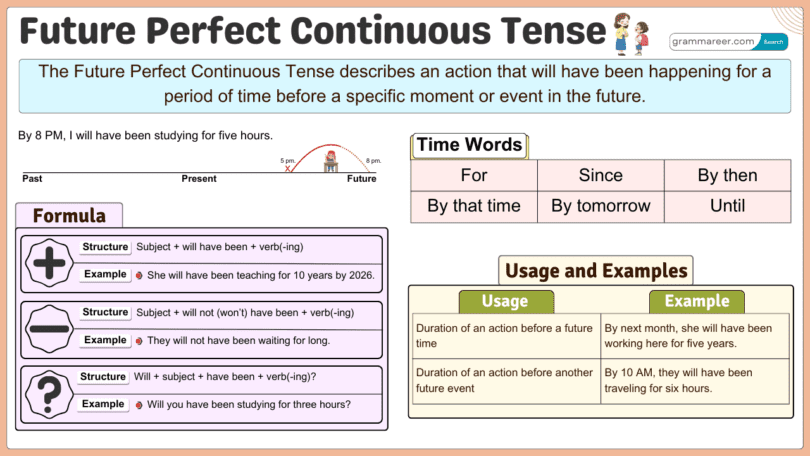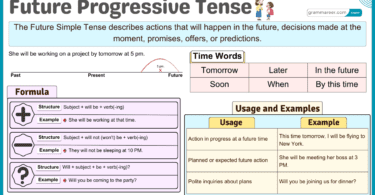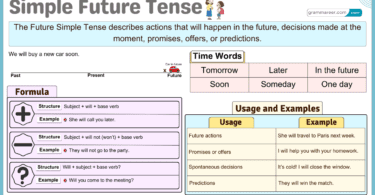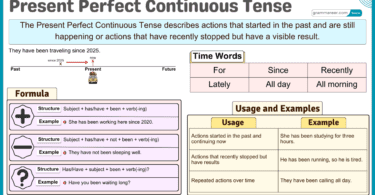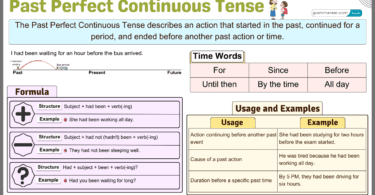Future Perfect Continuous Tense is an essential part in English grammar, The Future Perfect Continuous Tense is used to describe actions that will continue up to a certain point in the future. It emphasizes the duration of an activity that will be in progress until a specified future time. Understanding the structure and uses of the Future Perfect Continuous Tense will improve your ability to express ongoing future actions, making your communication clearer when discussing future plans and expectations.
Table of Contents
Sentence Structures of the Future Perfect Continuous Tense
The Future Perfect Continuous Tense has three main structures: affirmative, negative, and interrogative sentences.
Affirmative Sentences
Structure: Subject + will have been + Verb + -ing + Object
Examples:
- Aisha will have been working at the company for five years by next June.
- They will have been traveling for ten hours by the time they arrive.
In both examples, will have been is used with all subjects, followed by the -ing form of the main verb.
Negative Sentences
Structure: Subject + will not have been + Verb + -ing + Object
Examples:
- Bilal will not have been studying for long when you meet him.
- We won’t have been waiting for more than an hour.
The contraction won’t have been is commonly used instead of will not have been.
Interrogative Sentences
Structure: Will + Subject + have been + Verb + -ing + Object + ?
Examples:
- Will Hamza have been working on the project by next week?
- Will they have been living in the new house for a year by December?
Double Interrogative Sentences
Structure: Question Word + will + Subject + have been + Verb + -ing + Object + ?
Examples:
- What will Fatima have been doing by the end of this month?
- Where will they have been going before the meeting starts?
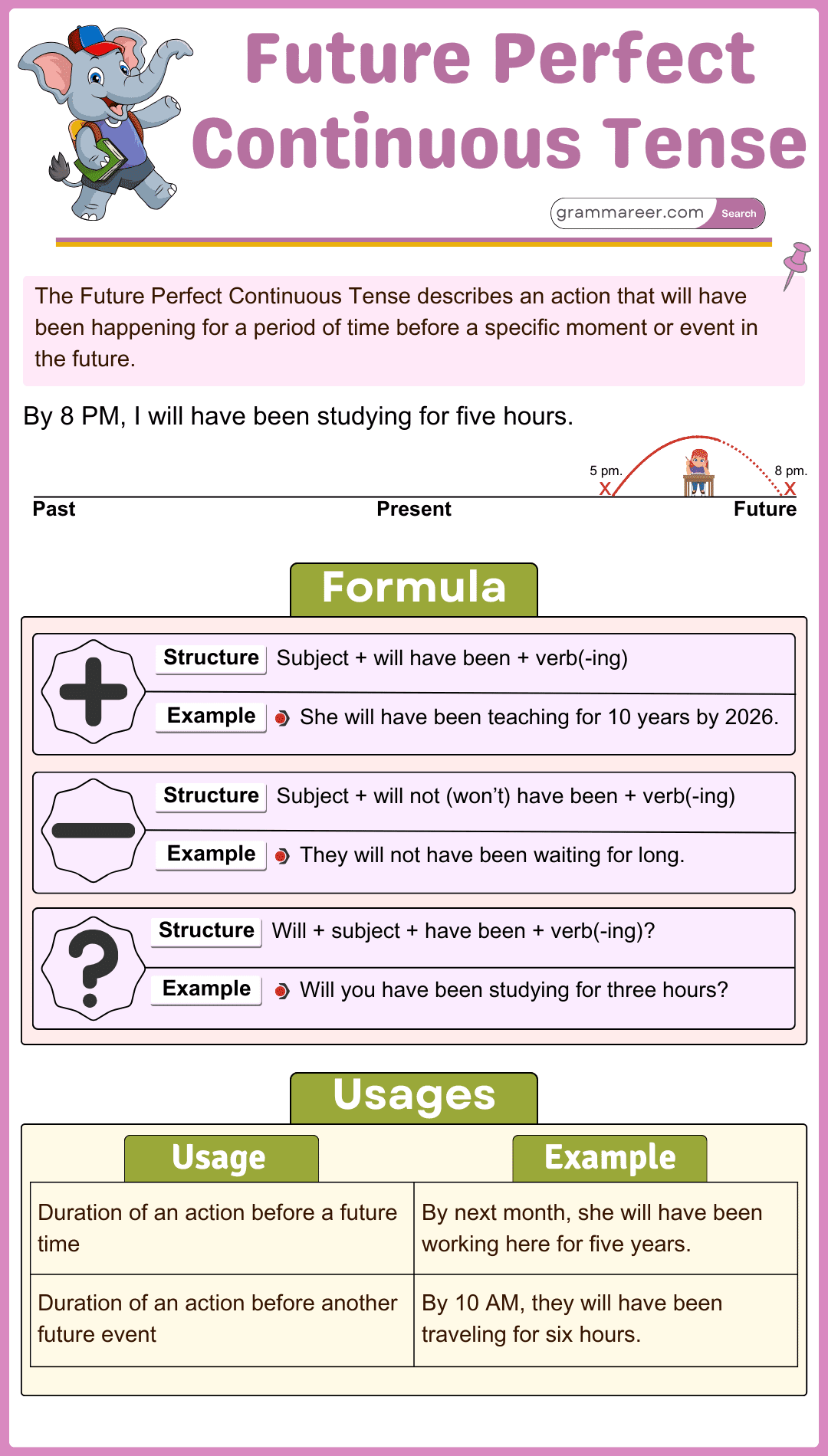
Subject-Verb Agreement in Future Perfect Continuous
In the Future Perfect Continuous Tense, will have been is used with all subjects, both singular and plural.
| Subject | Helping Verb | Main Verb Example |
|---|---|---|
| I | will have been | will have been studying |
| You | will have been | will have been playing |
| He/She/It | will have been | will have been writing |
| We/They | will have been | will have been learning |
| The teacher | will have been | will have been explaining |
| My parents | will have been | will have been traveling |
Time Expressions in Future Perfect Continuous
Time expressions in the Future Perfect Continuous Tense indicate the duration of an action that will have been ongoing up to a specific point in the future. They help clarify how long the action will have continued before that future moment.
- By next year: She will have been working here by next year.
- For five years: They will have been studying for five years.
- By the time: By the time we arrive, they will have been waiting.
- Since 2020: He will have been living here since 2020.
- For two hours: We will have been traveling for two hours.
Adverb Placement in Future Perfect Continuous
Adverbs like probably, definitely, surely, soon are placed between ‘will’ and ‘have been’.
Examples:
- She will probably have been working on the project by then.
- They will definitely have been living there for a year.
Uses of the Future Perfect Continuous Tense
The Future Perfect Continuous Tense is used to describe actions that will have been in progress for a certain period of time before a specific future time or event. It is formed using will have been + verb + ing.
1. Actions Continuing Up to a Specific Time in the Future
It shows that an action will have been happening for a period of time before a future moment.
- By next month, she will have been working here for five years.
- They will have been traveling for 12 hours by the time they reach their destination.
2. Emphasizing the Duration of a Future Activity
It highlights how long an action will have lasted at a certain future point, often using for or since to indicate the duration.
- By 8 PM, I will have been studying for six hours straight.
- He will have been living abroad since 2020 when he returns next year.
3. Showing the Cause of a Future Situation
It explains the reason for a future condition by focusing on the continuous activity that leads to it.
- She will be tired because she will have been working all day.
- They will be hungry as they will have been hiking for hours.
4. Predictions About Ongoing Future Activities
It predicts ongoing activities that are expected to be happening for a while before a future event.
- By this time tomorrow, we will have been driving for ten hours.
- They will have been waiting for the results when the announcement is made.
Short Answers in Future Perfect Continuous
Short answers in the Future Perfect Continuous Tense give brief responses about actions that will have been ongoing in the future, keeping conversations clear and concise. Below is a table with examples:
| Question | Short Answer |
| Will you have been working here long? | Yes, I will. |
| Will she have been studying all day? | No, she won’t. |
| Will they have been traveling abroad? | Yes, they will. |
| Will Ahmed have been reading this book? | No, he won’t. |
Question Tags in Future Perfect Continuous
Question tags are short questions added at the end of a sentence to confirm information or seek agreement.
| Sentence | Question Tag |
| You will have been working hard, won’t you? | won’t you? |
| He will have been playing football, won’t he? | won’t he? |
| They will have been traveling, won’t they? | won’t they? |
| She will have been studying, won’t she? | won’t she? |
Examples of Future Perfect Continuous in Use
Here are more examples to help you understand the Future Perfect Continuous Tense:
- Affirmative:
- Hassan will have been eating lunch for an hour by 2 PM.
- We will have been living in Karachi for five years by next June.
- She will have been attending the workshop for two days by tomorrow.
- Negative:
- She will not have been finishing the project by this evening.
- They won’t have been attending the meeting for long.
- Ahmed won’t have been agreeing with the decision.
- Interrogative:
- Will you have been attending the conference by next week?
- Will Hina have been calling her friend for hours?
- Will they have been traveling abroad before next year?
Common Mistakes with Future Perfect Continuous
Many learners make errors in this tense. Here are some common mistakes and their corrections:
- ✅ She will have been going to the market.
- ❌ She will has been going to the market.
- ✅ They won’t have been eating lunch.
- ❌ They will not eating lunch.
- ✅ Will you have been seeing that movie?
- ❌ Will you seeing that movie?
- ✅ The baby will have been sleeping for two hours.
- ❌ The baby will sleeping for two hours.
FAQs
To describe ongoing actions that will continue up to a specific future time. Example: “Ali will have been studying for three hours by 8 PM.”
Subject + will have been + verb-ing + object. Example: “She will have been studying tomorrow.”
Subject + will not (won’t) have been + verb-ing + object. Example: “He won’t have been going to school.”
Will + subject + have been + verb-ing + object? Example: “Will you have been attending the party?”
Yes. Example: “I/You/He/She/They will have been working.”
You May Also Like

